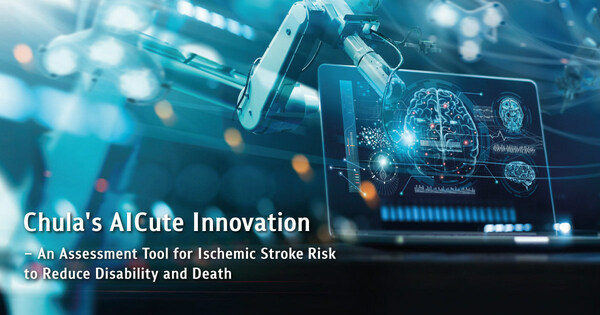A research team from the Faculty of Medicine and Faculty of Engineering, Chulalongkorn University has jointly developed AICute, an innovative program to assess the chance of stroke caused by heart disease (Ischemic Stroke), aimed at helping hospitals that lack cardiologists to enhance the effectiveness of stroke treatment, reduce congestion in hospitals and medical schools.
BANGKOK, Feb. 28, 2023 /PRNewswire/ -- Thailand has approximately 250,000 patients suffering from strokes each year, or one stroke for every 2 minutes. Of these, 30 percent may die, and 30 percent are severely disabled. Although most patients who suffered from a stroke are in their 50s-60s, today, the age range is increasingly younger due to lack of physical activity and rest, smoking, substance abuse, an imbalanced diet, and chronic diseases such as hypertension, hyperlipidemia, diabetes, snoring/sleep apnea, and heart disease.
Although stroke is life-threatening if the cause of the disease is known and treated quickly, the likelihood of recovery from the disease is high and the recurrence of the disease can be reduced. "Determining the cause of the disease is important to provide accurate and effective treatment while preventing reoccurrence…," said Wasan Akarathanawat, M.D., the Chulalongkorn Stroke Center of Excellence.
Currently, 18% of strokes are caused by heart disease. "Patients in this group often suffer from atrial fibrillation and valve dysfunction or cardiac hypertrophy, which leads to a risk of thrombosis inside the heart, and the clot could drift and cause blockage in the brain, resulting in a stroke."
To determine the cause of Ischemic stroke, a thorough cardiac examination by a skilled cardiologist echocardiography and cardiac monitoring device are needed -- a factor that is still scarce in community hospitals in remote areas. "This is why the research team has chosen first to develop innovations to assess the stroke caused by the heart," said Dr. Wasan.
AICute is a web application with artificial intelligence (AI) to analyze and evaluate patients for the risk of stroke from heart disease. It enables doctors in the community and small hospitals to make decisions and send patients to heart examinations more rapidly, making the treatment of stroke more effective. AICute's accuracy is at 92-94 percent according to the database of 40,000 high-resolution X-ray images.
Continue reading at https://www.chula.ac.th/en/highlight/106014/
For more information, please contact Chulalongkorn Stroke Center of Excellence, Tel. +662 256 4000 Ext. 80724-5
Media Contact:
Chula Communication Center
Email: Pataraporn.r@chula.ac.th











